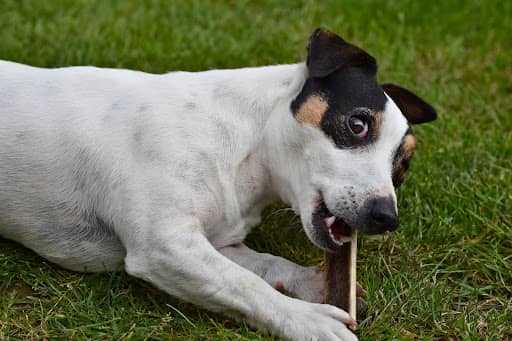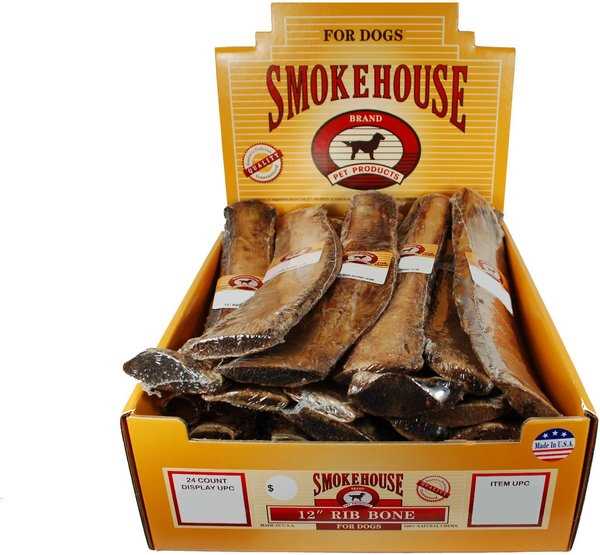

Many dog owners wonder if it is safe to feed their pets cooked beef rib bones. While dogs love to chew on bones, it is important to be aware of the potential risks involved.
First and foremost, it is crucial to understand that cooked beef rib bones can pose serious risks to dogs. When bones are cooked, they become more brittle and can easily splinter into sharp shards. These sharp pieces can cause serious damage to a dog’s mouth, throat, or digestive system.
Additionally, dogs that swallow large or sharp fragments of cooked beef rib bones may experience gastrointestinal problems such as blockages or perforations. These conditions can be extremely painful and even life-threatening.
It is strongly recommended that dog owners avoid giving their pets cooked beef rib bones, as the risks outweigh any potential benefits. Instead, consider providing safer alternatives such as specially-designed dog chew toys or raw bones that have not been cooked.
In conclusion, while dogs may enjoy chewing on cooked beef rib bones, it is not worth the potential harm they can cause. The safety and well-being of our furry friends should always be our top priority.
Can Dogs Eat Cooked Beef Rib Bones?
Cooked beef rib bones may seem like a tasty treat for your dog, but they can actually be dangerous and potentially harmful to their health. While some bones, such as raw beef bones, can provide dental benefits and a source of nutrients, cooked beef rib bones pose several risks.
Risks of Cooked Beef Rib Bones
1. Choking Hazard: Cooked bones can splinter easily, especially when chewed by dogs. These splinters can cause choking and lead to serious injuries in the mouth, throat, or digestive tract. They may also become lodged in the intestines, causing blockages.
2. Dental Damage: The hardness of cooked beef rib bones can cause fractures or breaks in your dog’s teeth. This can lead to pain, discomfort, and infections. Chipped teeth may require veterinary treatment or even extraction.
3. Internal Injuries: If a cooked bone splinters and is swallowed, it can cause tears or punctures in the digestive tract, leading to internal bleeding or infections.
Alternative Options
Instead of giving your dog cooked beef rib bones, there are safer alternative options to consider:
- Raw Bones: Raw beef bones can be a safer option for dogs as they are less likely to splinter. Additionally, raw bones can help promote dental health and provide nutrients.
- Dog-Specific Chew Toys: Choose durable chew toys designed specifically for dogs. These toys are made to withstand heavy chewing and are a safer alternative to bones.
- Dental Chew Treats: There are various dental chew treats available on the market that can help promote dental health. Look for options that are specifically designed to be safe for dogs.
It’s always important to consult with your veterinarian before introducing any new treats or bones into your dog’s diet. They can provide you with personalized advice based on your dog’s breed, size, and overall health.
Importance of a balanced diet for dogs
Feeding your dog a balanced diet is crucial for their overall health and well-being. Just like humans, dogs require a variety of nutrients to stay healthy and maintain a strong immune system.
A balanced diet for dogs typically consists of high-quality proteins, carbohydrates, healthy fats, vitamins, and minerals. Proteins are essential for building and repairing tissues, while carbohydrates provide energy. Healthy fats, such as omega-3 fatty acids, are important for a dog’s skin and coat health.
Vitamins and minerals play a vital role in supporting various bodily functions, including maintaining strong bones and teeth, supporting a healthy immune system, and promoting proper organ function. It is important to provide a variety of fruits and vegetables to ensure your dog gets a wide range of essential vitamins and minerals.
When planning your dog’s diet, it is crucial to consider their age, size, and activity level. Puppies and active dogs may require more protein and calories, while older dogs may benefit from a diet lower in fat and calories to prevent weight gain.
A balanced diet also helps to prevent common health issues in dogs, such as obesity, dental problems, and gastrointestinal issues. Overfeeding or feeding your dog a diet that lacks essential nutrients can lead to weight gain, tooth decay, and digestive disorders.
It is important to consult with your veterinarian or a professional animal nutritionist to determine the best diet for your dog. They can provide guidance on portion sizes, feeding schedules, and any specific dietary needs your dog may have, such as food allergies or sensitivities.
| Nutrient | Sources | Benefits |
|---|---|---|
| Proteins | Meat, fish, poultry | Building and repairing tissues |
| Carbohydrates | Whole grains, vegetables | Energy source |
| Healthy Fats | Fish oil, flaxseed | Healthy skin and coat |
| Vitamins and Minerals | Fruits, vegetables | Supports bodily functions |
In conclusion, providing your dog with a balanced diet is essential for their overall health and longevity. By ensuring they receive the necessary nutrients, you can help prevent health issues and promote a happy and active life for your furry friend.
Risks of feeding cooked beef rib bones
Feeding cooked beef rib bones to your dog can be dangerous and should be avoided. Although dogs love to chew on bones, cooked bones pose several risks that can lead to serious health issues.
The first risk is splintering. Cooked bones are more likely to splinter than raw bones due to the cooking process. These sharp splinters can cause serious injuries to your dog’s mouth, throat, and digestive system. They can also get stuck in their gums or throat, causing pain and discomfort.
Another risk of feeding cooked beef rib bones is the potential for blockages. Dogs can easily swallow small pieces of bones, which can get lodged in their throat or digestive tract. This can lead to choking or blockages that require emergency surgery to remove.
Additionally, cooked bones can cause dental issues. The hardness of the bone can break or crack your dog’s teeth, leading to tooth fractures or infections. These dental problems can be painful and may require costly dental procedures to treat.
Furthermore, cooked bones can cause digestive problems. The sharp edges of the bones can irritate the lining of the stomach or intestines, leading to inflammation or perforation. This can result in symptoms such as abdominal pain, vomiting, diarrhea, and even internal bleeding.
Given these risks, it is best to provide your dog with safe alternatives for chewing, such as chew toys or specially designed dog bones. Always consult with your veterinarian before introducing any new food or treats into your dog’s diet to ensure their safety and well-being.
Potential dangers and hazards

While beef rib bones can provide a tasty treat and entertainment for dogs, it is important to be aware of the potential dangers and hazards they pose.
Possible choking hazards
When dogs chew on beef rib bones, there is a risk that small pieces can break off and become lodged in their throat. This can lead to choking, which can be a life-threatening emergency. It is crucial to supervise dogs closely while they are chewing bones and intervene if necessary.
Risk of dental damage

Chewing on hard bones, such as beef rib bones, can also pose a risk of dental damage. Dogs’ teeth may crack, fracture, or break as they gnaw on the bone. This could lead to pain, infection, or the need for dental procedures to repair the damage.
It is important to note that some dogs may be more prone to dental issues than others, so it is best to consult with a veterinarian before allowing your dog to chew on bones.
Additionally, cooked bones are harder and more brittle than raw bones, making them more likely to cause dental damage. Therefore, it is recommended to only give dogs raw beef rib bones to chew on.
Intestinal blockages
Consuming bones, especially in large pieces, can result in intestinal blockages. These blockages can cause severe pain, vomiting, diarrhea, and potentially require surgical intervention. It is important to monitor your dog’s stool and digestion after they have consumed beef rib bones to ensure they are passing them without any issues.
If you suspect that your dog has swallowed a bone or is experiencing any digestive issues, it is crucial to seek veterinary attention immediately.
In conclusion, while beef rib bones can provide enjoyment for dogs, they come with potential dangers and hazards. It is essential to monitor your dog closely, provide appropriate size bones, and consult with a veterinarian to ensure their safety and well-being.
Alternatives to feeding beef rib bones
If you are concerned about the safety of feeding cooked beef rib bones to your dog, there are several alternatives that you can consider:
1. Raw bones: Raw bones, such as raw beef bones or raw chicken necks, can be a safer option for your dog. Raw bones are softer and less likely to splinter compared to cooked bones. However, it is important to supervise your dog while they are chewing on raw bones to prevent any potential choking hazards.
2. Commercial dog chews: There are many commercially available dog chews on the market that are specifically designed to provide a safe and satisfying chewing experience for dogs. These chews are made from natural ingredients and come in various shapes and sizes to cater to different breeds and sizes of dogs.
3. Dental chews: Dental chews are not only a tasty treat for dogs but also help promote good dental hygiene by reducing tartar buildup and freshening breath. Look for dental chews that are recommended by veterinarians and specifically designed to be safe for dogs to chew on.
4. Soft toys: If your dog enjoys chewing but you are concerned about the safety of bones, consider providing your dog with soft toys that are specifically designed for chewing. Look for toys made from durable materials that can withstand the chewing and biting of your dog.
5. Dog-friendly fruits and vegetables: Some fruits and vegetables, such as carrots or apple slices, can be a safe and healthy alternative for dogs to chew on. However, always make sure to remove any seeds, pits, or potentially harmful parts before offering them to your dog.
Remember, it is always important to consult with your veterinarian before introducing any new food or chew to your dog’s diet. They can provide you with personalized recommendations based on your dog’s breed, size, and individual needs.
Question-answer
Can dogs eat cooked beef rib bones?
No, dogs should not eat cooked beef rib bones. Cooked bones can splinter and cause serious internal injuries to dogs.
Why can’t dogs eat cooked beef rib bones?
Dogs cannot eat cooked beef rib bones because they can splinter and cause injuries to their throat, stomach, or intestines.
What can happen if a dog eats cooked beef rib bones?
If a dog eats cooked beef rib bones, it can lead to choking, blockage, or tears in their digestive system, which can be life-threatening and may require surgery.
Are there any alternatives to feeding dogs cooked beef rib bones?
Yes, there are safer alternatives to feeding dogs cooked beef rib bones. You can give them raw bones or specially made bones that are designed for dogs to chew on.
What should I do if my dog accidentally eats a cooked beef rib bone?
If your dog accidentally eats a cooked beef rib bone, you should monitor them closely for any signs of distress. If they show symptoms like difficulty breathing, vomiting, or diarrhea, you should immediately contact your veterinarian.
Can dogs eat cooked beef rib bones?
It is not recommended to give dogs cooked beef rib bones. Cooked bones can splinter and cause serious injuries such as choking, intestinal obstructions, or damage to the mouth or digestive tract. It is safer to offer dogs raw meaty bones or specially designed dog bones.







